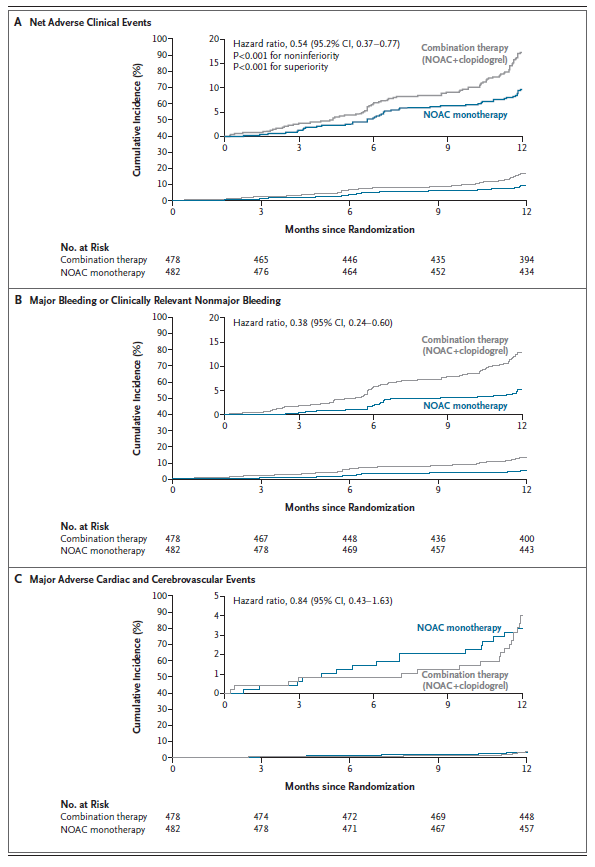
Anticoagulant monotherapy is superior to combination therapy with an anticoagulant plus a single antiplatelet agent in patients with atrial fibrillation (AF) who received stent implantation, a Korean study showed.
A research team led by Professors Kim Jung-sun, Pak Hui-nam, Lee Seung-jun, Yu Hee-tae, Lee Yong-joon, and Lee Sang-hyup of the Department of Cardiology at Yonsei University Severance Hospital said Monday that in patients with atrial fibrillation who had stents implanted, non–vitamin K antagonist oral anticoagulant (NOAC) monotherapy showed fewer adverse events, such as bleeding, and greater overall safety compared with dual therapy combining an anticoagulant with a single antiplatelet agent.
The findings were presented as a late-breaking clinical trial at the American Heart Association (AHA) Scientific Sessions and published simultaneously in the New England Journal of Medicine (NEJM; impact factor 78.5).

AF is known to be a major risk factor for stroke and systemic embolism, and anticoagulation therapy is recommended to prevent intracardiac thrombus formation in these patients.
Patients who undergo percutaneous coronary intervention (PCI) with stent implantation receive antiplatelet therapy to prevent myocardial infarction and stent thrombosis.
Typically, dual antiplatelet therapy is maintained for one year after stent implantation, after which a single antiplatelet agent is recommended to reduce the risk of bleeding.
However, in patients with atrial fibrillation who have received stents, both anticoagulation therapy for AF and antiplatelet therapy for the stent remain necessary even after the first year.
This dual requirement increases the risk of bleeding, underscoring the importance of developing treatment strategies that can effectively balance efficacy and safety.
Current U.S. and European cardiology guidelines recommend anticoagulant monotherapy one year after stent implantation in patients with atrial fibrillation.
However, these recommendations are largely based on studies involving patients with coronary artery disease in general, rather than those specifically with stents, limiting their applicability to this subgroup.
To address this gap, the research team conducted the ADAPT AF-DES trial (Atrial Fibrillation Patients with Drug-Eluting Stents) to establish the most appropriate antithrombotic treatment strategy specifically for AF patients with stents.
Between April 2020 and May 2024, the team enrolled 960 patients with atrial fibrillation who had undergone stent implantation across 32 institutions in Korea.
Participants were randomly assigned to receive either anticoagulant monotherapy using apixaban or rivaroxaban, or dual therapy combining anticoagulation with the single antiplatelet drug clopidogrel.
Patients were followed for 12 months to compare clinical outcomes between the two groups.

Analysis showed that at one year, the composite incidence of death, myocardial infarction, stroke, systemic embolism, and major or nonmajor bleeding was 9.6 percent in the monotherapy group versus 17.2 percent in the combination group, confirming the higher safety of monotherapy.
Specifically, there were no significant differences between groups in ischemic outcomes such as death, myocardial infarction, stent thrombosis, stroke, or systemic embolism.
However, the rates of major and clinically relevant nonmajor bleeding were 2.3 percent and 2.9 percent in the monotherapy group, compared with 6.1 percent and 7.1 percent in the dual-therapy group, showing that patients receiving dual therapy experienced more bleeding events.
“This study carries special significance because it is the first to compare treatment strategies exclusively in patients with atrial fibrillation who have undergone stent implantation,” said Professor Kim Jung-sun.
“Our findings confirm that anticoagulant monotherapy in these patients reduces bleeding risk without increasing ischemic events compared with dual therapy. We expect that this evidence will help guide more strategic and safer treatment decisions for this patient group,” he added.
Related articles
- Medtronic’s leadless pacemaker hits 300,000 implants at 10 years
- VUNO to present 4 AI-powered ECG studies at ESC Congress 2025
- CGM-enabled insulin protocol enhances outcomes in cardiac surgery patients
- Stroke may trigger atrial fibrillation within 1 year, study finds
- Atrial fibrillation prevalence doubles in 10 years
- Severance Hospital named global training hub for FARAPULSE PFA system
- Sky Labs’ smart ring outperforms Apple Watch in AF detection accuracy

